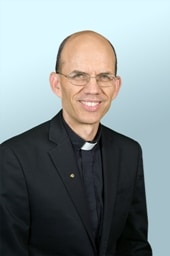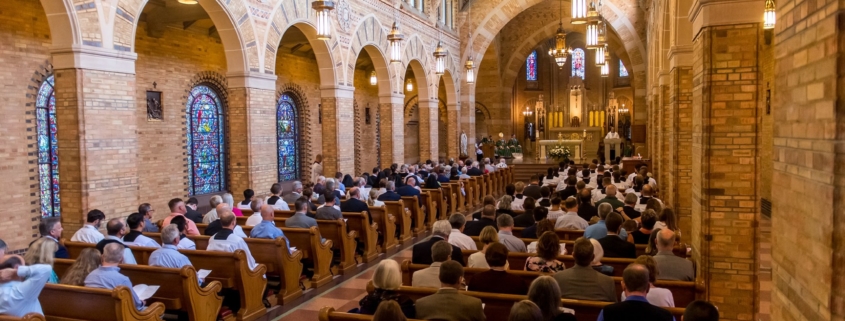Faithful College Graduate Defends Celibacy for Priests
Amid new challenges to priestly celibacy at the Vatican’s Amazon Synod and from other corners of the Church, the graduates of faithful Catholic education—by their deep formation and understanding of Church tradition—are well-prepared to dispel errors and misconceptions about this important discipline of Catholic priests.
One such graduate is Father Gary Selin, S.T.D., author of Priestly Celibacy: Theological Foundations and formation advisor and assistant professor at St. John Vianney Theological Seminary in Denver, Colo. He argues that celibacy “allows the priest to give himself more freely to the Church in imitation of Christ.”
A graduate of Thomas Aquinas College in Santa Paula, Calif., which is recommended in The Newman Guide, Fr. Selin says the College helped him “acquire the virtues necessary in becoming a disciple before learning to be a leader.”
When asked about his time at the College, Fr. Selin recounts how he was “impressed with the way that the students gravitated toward the chapel for Holy Mass and personal prayer.” He also remembers a fire that once surrounded the campus and how the flames “stopped in their tracks” after one of the College chaplains “blessed a hillside with the Blessed Sacrament.”
We are grateful for Fr. Selin’s willingness to respond to the questions below, as a part of our “Profiles in Faithful Catholic Education” series.
Newman Society: Priestly celibacy is one of the topics being discussed at the current Synod in Rome. Why did you decide a few years ago to write a book on this topic, and why do you think priestly celibacy is important?

Fr. Gary Selin: During my seminarian days, I heard Cardinal Francis Stafford give a talk about priestly celibacy, in which he argued that priestly celibacy is more than a mere ecclesial law that can be changed. Rather, it is integral to the priesthood and intrinsically related to the Eucharist. Through my research, I discovered that the principal reason for celibacy is that it perfects the configuration of the priest with Jesus Christ, the Head of the Church. Celibacy consequently allows the priest to give himself more freely to the Church in imitation of Christ.
Priestly celibacy is important, because it reminds us that we are created ultimately for God alone. There is an interesting interplay between celibacy and marriage in reference to our journey toward heaven. That is, the celibate priest serves as a reminder that marriage is not the end-all, but a sacrament through which people can grow in holiness. Married people are to help each other get to heaven. There are plenty of opportunities to grow spiritually in marriage, as it requires much sacrifice. On the other hand, spouses can remind the celibate priest that he is called to live a life of sacrificial service, and not one of a comfortable bachelor. Married couples have inspired me through their sacrificial love for each other, in imitation of Christ’s love for His Church (Ephesians 5:25).
Newman Society: How did Thomas Aquinas College help foster your vocation to the priesthood?
Fr. Gary Selin: At the college, I found myself within a strong community of students where friendships developed organically and deeply. We were united in our desire to deepen our understanding of the truth. I found that all the streamlets of truth led to a unified vision. The overall structure and dynamism of the curriculum led to contemplation of Divine Wisdom, the Triune God. Of course, God’s grace was present during the whole time.
I was also impressed with the way that the students gravitated toward the chapel for Holy Mass and personal prayer. The many hours that I spent in prayer in that chapel helped me see how Jesus Christ is the Truth, the source of the wisdom that we discovered through our studies and on our knees in prayer.
The atmosphere of friendliness and joy on campus helped me see more clearly that God desires our happiness and beatitude.
These experiences, along with serving Mass, having holy priest chaplains on campus, and my devotion to the Blessed Virgin Mary, helped me be more convinced that God had given to me a vocation to the ministerial priesthood.
Newman Society: Do you have any particularly impactful memories or stories from your experience at the College?
Fr. Gary Selin: In the fall semester of 1985, a large number of students consecrated ourselves to Our Lady at the Marian grotto. I think that it was the next day that a huge fire exploded on the mountains surrounding the campus. We were not able to leave the campus, because all roads were cut off by the fire. It was quite frightening. Many of us did what we could to fight back the flames. One of our priest chaplains blessed a hillside with the Blessed Sacrament, and the flames stopped in their tracks. The campus was saved from destruction, although everything around us was burnt. I felt strongly God’s presence during that time.
I treasure the memories of the many wonderful hours in the classroom, as I learned from the sources of wisdom of the great books that formed our Western civilization, under the guidance of our well-formed tutors of the college. These excellent conversations continued over meals, during walks, and into late night in the dormitories. One can never put a price tag on these conversations that made life worth living.
One regular visitor to the campus remarked how the students at the college were always joyful. I think that this was due to the good spirit among the faculty and students, rooted in Christ as the source of all joy. The sunny southern California days certainly helped as well!
Newman Society: How does your own formation help you in the formation of seminarians?
Fr. Gary Selin: St. John Berchmans once said, “My penance is community life.” Indeed, common life in the seminary can be difficult, but the blessings of forming and building a community overcomes the challenges. But my role as a mentor of seminarians demands of me a constant spirit of charity and self-forgetfulness. My time at the College helped me begin to acquire the virtues necessary in becoming a disciple before learning to be a leader. I am very grateful to the College for giving me the environment in which I was able to grow in those virtues. In my seminary formation work, I try to be a servant-leader, following the words of Jesus in His discourse at the Last Supper. In order for me to be an instrument of the Holy Spirit in the work of forming future priests, I must learn to serve and not to be served.

